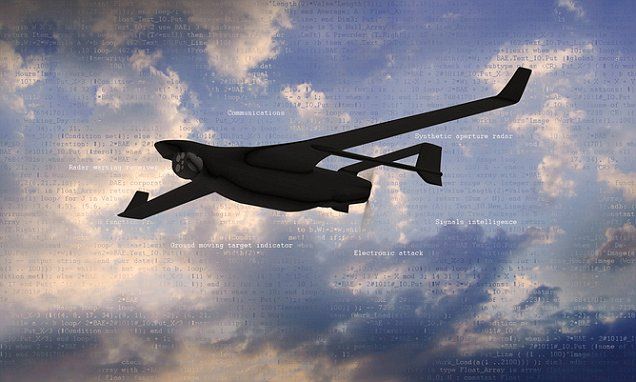Archive for the ‘military’ category: Page 248
Jun 8, 2017
DARPA ‘transformer’ drones change their mission hardware mid-flight
Posted by Carse Peel in categories: drones, military, robotics/AI

DARPA has unveiled a system that transforms its unmanned aerial systems (UAS) into warfare machines capable of conducting different missions without human intervention.
Prior to the announcement, the compact drones were only able to carry a single-function payload, which limited their abilities to one specific task in the field.
Continue reading “DARPA ‘transformer’ drones change their mission hardware mid-flight” »
Jun 7, 2017
The Hypersuit’s Creators Say It Can Train Military Pilots
Posted by Shailesh Prasad in categories: cyborgs, military, virtual reality
May 29, 2017
ROBOT ARMIES: End of western soldiers in war zones ‘within a DECADE’ as MACHINES take over
Posted by Zoltan Istvan in categories: military, robotics/AI
Peace and love on this Memorial Day to those who served and gave their lives for freedom. My interview a while back with Express is still right on.track about the future of military and how most human soldier casualties will be a thing of the past.
THERE will be no longer be human casualties of war from wealthy countries within 10 years as advanced militaries will begin sending MACHINES to warzones, an expert has claimed.
May 25, 2017
DARPA Picks Boeing To Build Its New Space Plane
Posted by Dan Kummer in categories: military, satellites

The research agency hopes its XS-1 jumpstarts a whole new industry of very-low-cost satellite launches.
Boeing did such a good job plotting out the commercial future of a reusable satellite-launching plane that they’re going to get to build it — and just maybe, launch a whole new low-cost satellite industry.
Continue reading “DARPA Picks Boeing To Build Its New Space Plane” »
May 21, 2017
‘A robot doesn’t have to shoot back,’ Rodney Brooks says of machines in the military
Posted by Brett Gallie II in categories: military, robotics/AI
Rethink Robotics co-founder and CTO, former CSAIL director and all-around robot luminary Rodney Brooks joined the Disrupt New York stage this afternoon to tackle some complex questions, ranging from robots place in the living room to the battlefield.
Brooks has a fair bit of experience in both categories, as a cofounder of iRobot, whose product offerings have ranging from vacuuming to bomb diffusion. And while his current company deals more in the realm of factory automation, a number of these ethical issues still clearly weigh heavily on the Australian roboticist.
It was a question about whether robots should be considered unfit for any human tasks that really caused Brooks to ponder their place in the world.
May 20, 2017
Air Force Unmanned Fighter Jets
Posted by Dan Kummer in categories: military, robotics/AI
May 16, 2017
DARPA Wants Artificial Intelligence That Doesn’t Forget Everything It Knows
Posted by Dan Kummer in categories: biological, military, robotics/AI
Biological systems don’t completely freeze up when they encounter a new situation, but computers often do.
Biological organisms are pretty good at navigating life’s unpredictability, but computers are embarrassingly bad at it.
That’s the crux of a new military research program that aims to model artificially intelligent systems after the brains of living creatures. When an organism encounters a new environment or situation, it relies on past experience to help it make a decision. Current artificial intelligence technology, on the other hand, relies on extensive training on various data sets, and if it hasn’t encountered a specific situation, it can’t select a next step.
Continue reading “DARPA Wants Artificial Intelligence That Doesn’t Forget Everything It Knows” »

Tracked Combat Vehicles
Multi-Utility Tactical Transport (MUTT)
May 7, 2017
Unmanned U.S. Air Force space plane lands after secret, two-year mission
Posted by Dan Kummer in categories: military, robotics/AI, space travel
By Irene Klotz
CAPE CANAVERAL, Fla. (Reuters) — The U.S. military’s experimental X-37B space plane landed on Sunday at NASA’s Kennedy Space Center in Florida, completing a classified mission that lasted nearly two years, the Air Force said.
The unmanned X-37B, which resembles a miniature space shuttle, touched down at 7:47 a.m. EDT (1147 GMT) on a runway formerly used for landings of the now-mothballed space shuttles, the Air Force said in an email.
Continue reading “Unmanned U.S. Air Force space plane lands after secret, two-year mission” »















